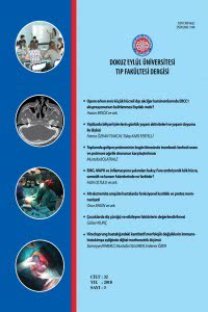Tekrarlayan serum PSA ölçümlerindeki farklılıkların referans değişim değeri ile karşılaştırılması
Prostat spesifik antijen, referans değişim değeri, biyolojik değişkenlik
Comparison Of Differences In Recurrent Serum PSA Measurements With Reference Change Value
___
- Referans1 American Cancer Society. Cancer Facts & Figures 2015. Cancer Facts Fig 2015;2015:1–9.
- Referans2 Graves HCB, Ph D. Standardization of lmmunoassays for Prostate-Specific Antigen A Problem of Prostate-Specific Antigen Complexation or a Problem of Assay Design:3141–4.
- Referans3 Lilja H, Christensson A, Dahlén U, Matikainen MT, Nilsson O, Pettersson K, et al. Prostate-specific antigen in serum occurs predominantly in complex with α1-antichymotrypsin. Clin Chem. 1991;37:1618–25.
- Referans4 Wang MC, Papsidero LD, Kuriyama M, Valenzuela LA, Murphy GP, Chu TM. Prostate antigen: a new potential marker for prostatic cancer. Prostate [Internet]. 1981;2:89–96.
- Referans5 Atan A, Guzel O. How should prostate specific antigen be interpreted? Türk Üroloji Dergisi/Turkish J Urol [Internet] 2014;39:188–93.
- Referans6 Greene KL, Albertsen PC, Babaian RJ, Carter HB, Gann PH, Han M, et al. Prostate Specific Antigen Best Practice Statement: 2009 Update. J Urol [Internet]. Elsevier Inc 2009;182:2232–41.
- Referans7 Kutlu O, Koksal IT. Efforts for Improving the Efficiency of PSA: PSA Density, PSA Velocity, Age-specific PSA, and Free and Complexed PSA. Türk Üroloji Semin Urol Semin [Internet] 2013;3:55–60.
- Referans8 Obort AS, Ajadi MB, Akinloye O. Prostate-specific antigen: any successor in sight. Rev Urol [Internet]. 2013;15:97–107.
- Referans9 Desirable Biological Variation Database specifications - Westgard [Internet]. https://www.westgard.com/biodatabase1.htm (Erişim tarihi: 26 Kasım 2016).
- Referans10 Eastham JA, Riedel E, Scardino PT, et al.; Polyp Prevention Trial Study Group. Variation of Serum prostate-specific antigen levels: an evaluation of year-to-yearfluctuations. JAMA 2003;289:2695–700.
- Referans11 Ergen G, Tezcan G, Soydaş ÖA, Yıldırımkaya MM. Biological variation and reference change value (RCV) of prostate specific antigen (PSA) levels in the serum of healthy young individuals.Gazi Tıp Dergisi 2009;152–6.
- Referans12 Laserna-Mendieta EJ, Pineda-Tenor D, Timón-Zapata J, Carretero-Gómez JF, Valle-Muñoz J, Gómez-Serranillos M. A proposed reference change value for an IgA anti-tissue transglutaminase immunoassay to improve interpretation of serial results in celiac patients. Clin Chim Acta [Internet]. Elsevier B.V.; 2013;421:12–6.
- Referans13 Klersy C, d’Eril GVM, Barassi A, Palladini G, Comelli M, Moratti R, et al. Advantages of the lognormal approach to determining reference change values for N-terminal propeptide B-type natriuretic peptide. Clin Chim Acta [Internet]. Elsevier B.V.; 2012;413:544–7.
- Referans14 Wu AHB. Biological and analytical variation of clinical biomarker testing: Implications for biomarker-guided therapy. Curr Heart Fail Rep. 2013;10:434–40.
- Referans15 Matyar S, Goruroglu Ozturk O, Ziyanoglu Karacor E, Yuzbasioglu Ariyurek S, Sahin G, Kibar F, et al. Biological Variation and Reference Change Value Data for Serum Neuron-Specific Enolase in a Turkish Population. J Clin Lab Anal [Internet]. 2016;30(6):1081–5.
- Referans16 Iglesias N, Petersen PH, Ricós C. Power function of the reference change value in relation to cut-off points, reference intervals and index of individuality. Clin Chem Lab Med [Internet]. 2005 Jan 1 [cited 2016 Dec 10];43:441–8.
- Referans17 Badiou S, Boudet A, Leray-Moragues H, Rodriguez A, Bargnoux AS, Dupuy AM, et al. Monthly reference change value of cardiac troponin in hemodialysis patients as a useful tool for long-term cardiovascular management. Clin Biochem [Internet]. The Canadian Society of Clinical Chemists; 2016;49:1195–8.
- Referans18 Corte Z, Garcia C, Venta R. Biological variation of cardiac troponin T in patients with end-stage renal disease and in healthy individuals. Ann Clin Biochem An Int J Biochem Lab Med [Internet]. 2014;52:53–60.
- Referans19 Sandoval Y, Herzog CA, Love SA, Cao J, Hu Y, Wu AHB, et al. Prognostic Value of Serial Changes in High-Sensitivity Cardiac Troponin I and T over 3 Months Using Reference Change Values in Hemodialysis Patients. Clin Chem [Internet]. 2016;62:631–8.
- Referans20 Simpson AJ, Potter JM, Koerbin G, Oakman C, Cullen L, Wilkes GJ, et al. Use of observed within-person variation of cardiac troponin in emergency department patients for determination of biological variation and percentage and absolute reference change values. Clin Chem. 2014;60:848–54.
- Referans21 Sölétormos G, Semjonow A, Sibley PEC, Lamerz R, Petersen PH, Albrecht W, et al. Biological variation of total prostate-specific antigen: A survey of published estimates and consequences for clinical practice. Clin Chem. 2005;51:1342–51.
- Referans22 Türk Radyasyon Onkolojisi Derneği [Internet]. https://www.trod.org.tr/egitim.php?id=90 (Erişim tarihi: 22 Aralık 16).
- Referans23 Heidenreich a, Bolla M, Joniau S, Mason MD, Matveev V, Mottet N, et al. Guidelines on Prostate Cancer. Update [Internet]. 2011;53:31–45.
- Referans24 Demir S, Zorbozan N, Basak E. Unnecessary repeated total cholesterol tests in biochemistry laboratory. Biochem Medica. 2016;26:77–81.
- Referans25 Miyakis S, Karamanof G, Liontos M, Mountokalakis TD. Factors contributing to inappropriate ordering of tests in an academic medical department and the effect of an educational feedback strategy. Postgr Med J [Internet]. 2006;82:823–9.
- ISSN: 1300-6622
- Yayın Aralığı: Yıllık
- Başlangıç: 2015
- Yayıncı: -
Bir üniversite hastanesinde çalışan hemşirelerin değerlendirilmesi
Hacer BULUT AKSOY, MUALLA AYLİN ARICI, ŞERİFE REYHAN UÇKU, AYŞE GELAL
Tekrarlayan serum PSA ölçümlerindeki farklılıkların referans değişim değeri ile karşılaştırılması
Müge GÜL GÜLEÇOĞLU ÖNEM, Sezer UYSAL
TURGUT ANUK, Şahin KAHRAMANCA, Ali Cihat YILDIRIM, Mahmut Can YAĞMURDUR
Aksiller bazal hücreli karsinom
İBRAHİM HALİL ERDOĞDU, Serap İŞLER, Birgül TEPE
Hacer BULUT AKSOY, Mualla Aylin ARICI, Reyhan UÇKU, Ayşe GELAL
Atipik nörolojik bulgular ile seyreden nadir bir hastalık: Fahr Hastalığı
SERTAŞ ERARSLAN, TÜRKAN PAŞALI KİLİT
Febril konvülziyon etyopatogenezinde genetiğin rolü
Vezikoüreteral reflü tedavisinde subüreterik enjeksiyon tedavisi: Tek merkez deneyimi
OKTAY ULUSOY, OSMAN ZEKİ KARAKUŞ, Serdar ŞIYVE, OĞUZ ATEŞ, FAİKA GÜLCE HAKGÜDER, MİRAÇ FEZA AKGÜR, MUSTAFA OLGUNER
